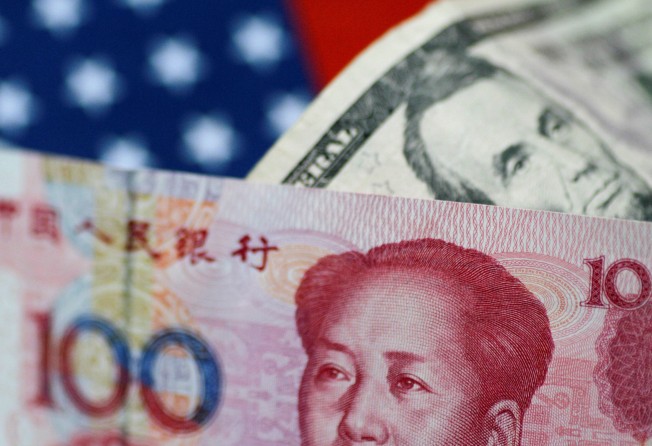Why China is unlikely to start a currency war amid escalating trade tension

Beijing will not use a sharply devalued yuan as a weapon to gain an upper hand in its trade war with the US, as it will do more bad than good to China’s economy and hurt its image as an upholder of free trade, according to analysts.
In the past month China’s yuan has swung from being one of the stronger global currencies to an underperformer, suffering a 3.3 per cent depreciation against the US dollar, reflecting its worst single-month decline since Beijing established its foreign exchange market in 1994.
Chinese officials have been careful to stress there is no official policy to devalue its currency as part of a salvo in the ongoing trade battle with the US, arguing instead that market forces have been the major driver in the yuan’s softening.
Guo Shuqing, party secretary of the central bank, said in a recent statement that the yuan’s drop is likely only temporary as China’s economic fundamental point to a stronger currency in the longer term.
“There is no possibility of significant depreciation,” Guo said in an interview on Thursday with the state-run media group Financial News, a publication affiliated with the People’s Bank of China. He added that the yuan would likely tend to be stronger in the future.
There is no possibility of significant depreciation
“In recent years, some international punters have tried to earn big profits by shorting the yuan. The facts proved they had made serious misjudgment over the situation,” he said.
Guo was the latest senior official to provide reassurance from Beijing that the yuan would not depreciate drastically.
PBOC governor Yi Gang and China’s foreign exchange administrator Pan Gongsheng made similar statements on repeated occasions in the past week.
The onshore yuan and its offshore counterpart traded in Hong Kong both rebounded against the US dollar on Friday afternoon, as US tariffs on Chinese imports came into effect.
China’s Ministry of Commerce said on Friday that it would take its case to the World Trade Organisation.
Government sources told the Post that Beijing has not adopted a weak yuan policy.
“In the trade war with the US, there were suggestions that China should allow the yuan to devalue moderately to offset impacts from Trump’s tariffs … but the Ministry of Commerce has long lost its decision-making power over the yuan, although it still has the influence,” a source within the Ministry of Commerce said.
The PBOC, which is the primary agency overseeing the yuan exchange rate, does not want to see a rapid depreciation, analysts said.
Instead, China would prefer a stable currency to help facilitate internal reform and economic transformation, in addition to stable relationships with the Eurozone, Japan and emerging economies.
“Net exports contributed only 0.7 percentage points to the overall growth made by the Chinese economy last year. Its contribution is largely dwarfed by domestic consumption and investment,” said Aidan Yao, senior emerging Asia economist at AXA Investment Managers Asia.
China’s priority is on stabilising internal conditions with proper monetary and fiscal policies, he said, adding that a currency war would cause regional or even global capital flow turmoil.
A significant devaluation against the US dollar is highly likely to trigger yuan depreciation against other major currencies – the beggar thy neighbour game will put everyone in a turbulent situation
“A significant devaluation against the US dollar is highly likely to trigger yuan depreciation against other major currencies – the beggar thy neighbour game will put everyone in a turbulent situation. It will go in conflict with China’s image as a defender of globalisation,” he said.
Shen Jianguang, an economist with Mizuho Securities Asia argued that the exchange rate was becoming less relevant in determining the flow of global exports.
“Exports are more closely related to real external demand and tariff policies rather than limited changes in exchange rates,” he wrote in a research note on Wednesday.
The Chinese yuan appreciated by over 6 per cent against the US dollar in 2017, while exports rebounded 10.8 per cent year on year.
The yuan continuously weakened during a two-year period starting in 2014 when global exports remained sluggish.
Shen also said a significantly weaker currency would not only undermine China’s domestic purchasing power and consumer sentiment, but also pose significant risk to China’s inflated property market.
“Moreover, large currency depreciation could cause domestic panic, trigger capital flight and negate the previous efforts of the Chinese government to stabilise the exchange rate and promote the internationalisation of yuan,” Shen said.
China orchestrated a 2 per cent depreciation in the yuan on August 11, 2015, a sign that the PBOC was giving the market more say in determining the currency’s daily mid price fixing, as Beijing was trying to join an elite reserve basket under the IMF.
What followed was a sharp sell of the yuan that drained China’s foreign exchange reserve by US$1 trillion, as officials fought to calm the situation.
“China must have leaned their lesson when seeing investors’ anxiety and significant capital outflow and capital market jitters. This is not a can of worms that Beijing wants to open again,” said Iris Pang, economist for Greater China at ING Bank.
“I do not think a currency war is making any sense for any country. Sharp currency depreciations in the past few years, like the krona depreciation when Iceland went bankrupt after the global financial crisis, are all driven by the market, but not by the government,” she said.